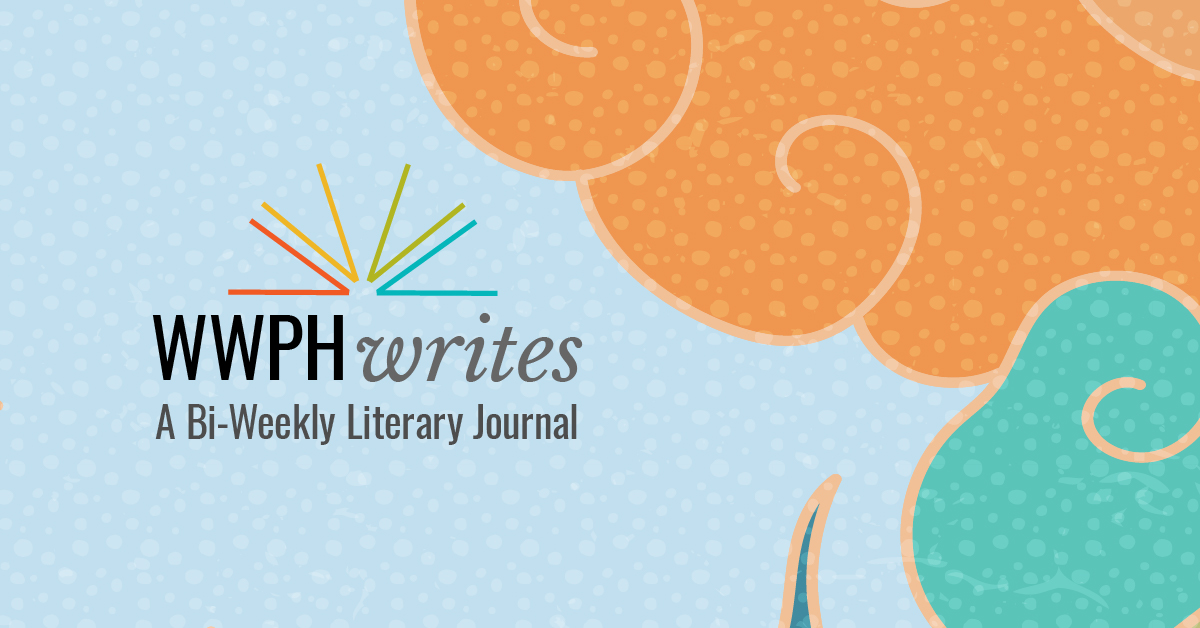WWPH Writes: Issue # 13

Issue #13
Dedicated to Poetry & Fiction Writers in the DMV
Welcome to Issue #13
Admit this to everyone: I love the intensity of Leslie Pietrzyk’s fiction. Pair her story “Admit This To No One” with Serena Agusto-Cox’s equally as timely and exacting poem, “Thanksgiving,” and we have a blockbuster edition of WWPH Writes to share with you. Full disclosure, both writers were included in our recent anthology, This Is What America Looks Like: Poetry & Fiction from DC, Maryland and Virginia. In fact, Leslie Pietrzyk’s story, reprinted from her brand-new short story collection of the same title, was originally published in the anthology, and we awarded it our first prize in fiction. I’ll admit this too: I have already ordered a copy of ADMIT THIS TO NO ONE. I cannot wait to read it.
If you are a writer living in DC, Maryland or Virginia, we have many opportunities for you to publish with WWPH. We have the deadline fast approaching for our annual contest for full-length fiction and poetry manuscripts. The deadline is Monday, November 15th. We also have our WWPH Writes The Holidays. See below for prompts and details–one poet and one fiction writer will each win $100 and publication in WWPH Writes on December 24.
Thank you all for being part of the Washington Writers’ Publishing House community. Read on!
Caroline Bock
Fiction Editor, WWPH Writes
WWPH Writes: Poetry
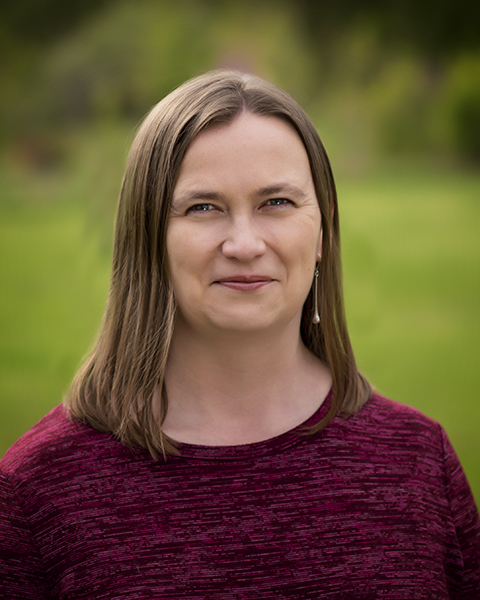
Serena Agusto-Cox was one of the first featured poets of the DiVerse Gaithersburg reading series in Maryland. Her poems are in The Magnolia Review, MacQueen’s Quinterly, Beltway Poetry Quarterly, Dissonance Magazine, Mothers Always Write, Bourgeon, and elsewhere. Work appears in the This Is What America Looks Like anthology, Mom Egg Review’s Pandemic Parenting issue, The Plague Papers digital anthology, H.L. Hix’s Made Priceless, Love Is Love: An Anthology for LGBTQIA+ Teens, and Midge Raymond’s Everyday Book Marketing. She also runs the book review blog, Savvy Verse & Wit, and founded Poetic Book Tours to help poets market their books.
Thanksgiving
I.
Highways packed with families,
trees crowded on the roadside, desolate
without leaves. An hour on the road, or more.
Early morning found me sleepy
on the backseat, head cold against the glass.
My aunt’s farm with creaky porch,
no swing. Snow crunching under tires
slipping and sliding into place.
Nana stands, floured hands
yarned Santa pinned perfectly
Her orchard-picked apples
bubbling, crust browning.
I’m shooed away from peering in the oven
with a dish towel snap.
II.
Table crowded, barely a slip
of paper between grownups. Their laughter high.
Us kids running after the cat,
dog’s breath beneath his nose
pressed to the windowpane.
Our little table crammed in the corner,
we waited, impatient and picky.
Plates of green, orange, and brown
like fall leaves fluttering by us
birds pecking here and there.
Salty, smooth potato pooled with butter,
dripping syrup of marshmallow and yams,
crisp crunch of green beans.
Plates piled up, bellies bulged.
We lay about like sated pigs
until it’s time for pie, melted cheddar, and ice cream.
©Serena Agust0-Cox 2021
WWPH Writes: Fiction
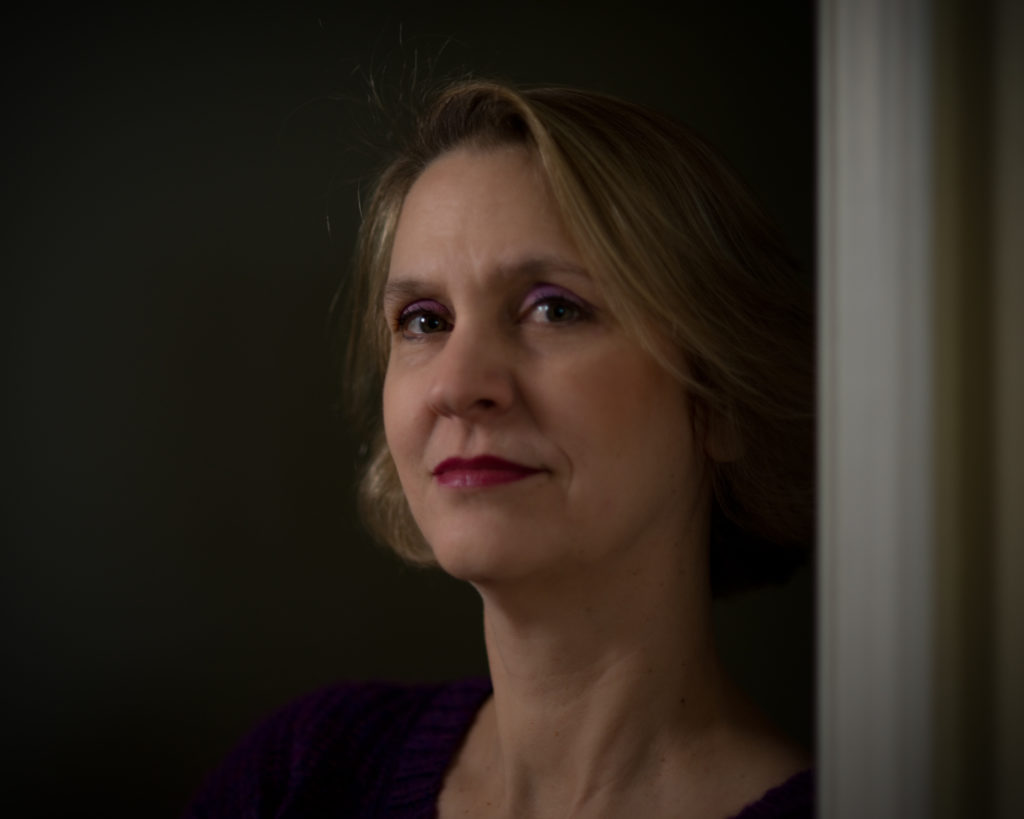
Leslie Pietrzyk’s collection of linked stories set in DC, Admit This to No One, is being published in November 2021 by Unnamed Press, the publisher of her 2018 novel Silver Girl. Her first collection of short stories, This Angel on My Chest, won the 2015 Drue Heinz Literature Prize and was published by University of Pittsburgh Press. She is the author of two additional novels, Pears on a Willow Tree (Avon) and A Year and a Day (William Morrow). Her short fiction and essays have appeared in, among others, Ploughshares, Story Magazine, The Hudson Review, Southern Review, The Gettysburg Review, Washingtonian, The Sun, and The Washington Post Magazine. Awards include a Pushcart Prize in 2020 and the 2020 Creative Arts Prize from the Polish American Historical Association. Organizations awarding fellowships include the Bread Loaf Writers’ Conference, the Sewanee Writers’ Conference, and Hawthornden International Retreat at Hawthornden Castle in Scotland.
This story, reprinted with permission, is now available in Leslie Pietrzyk’s new collection Admit This to No One (Unnamed Press). Purchase it now at bookshop.org
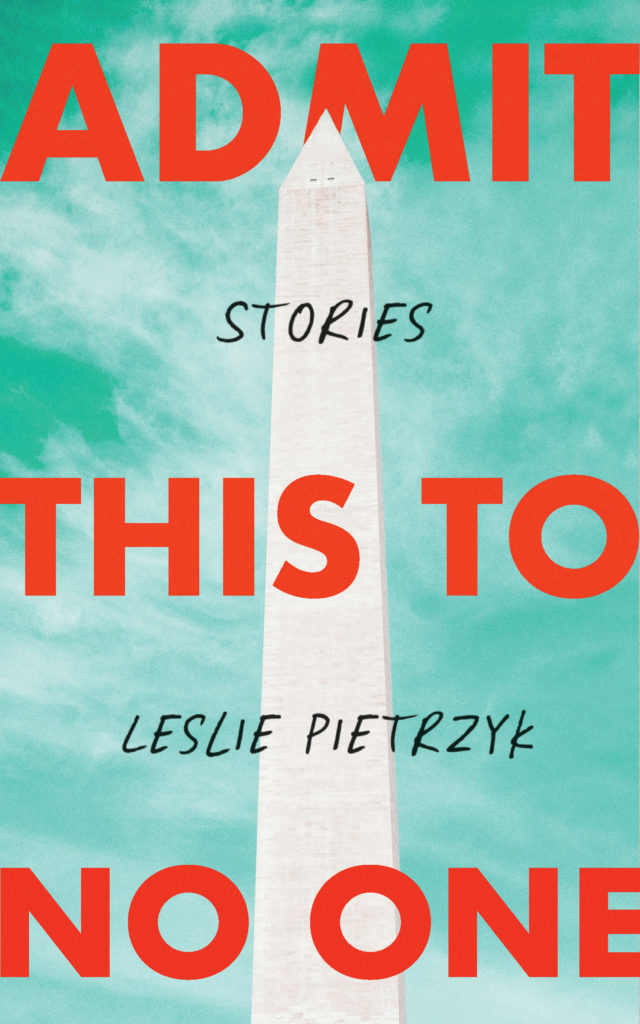
Admit This to No One
PRE-EVENING WAS THE PREFERRED TIME for this particular walk, tracing the dozen or so long blocks of Pennsylvania Avenue amidst a liquid glow of pinks and blues as the day’s light settled and slipped down into darkness. The between was where he felt comfortable, neither light nor dark, neither right nor wrong, neither Democrat nor Republican. It goes without saying that he would admit this to no one, least of all to himself. But he had been this way always, drawn to the middle, understanding that the world, that all of life, was middle more than edges.
The avenue was congested: heaving Metrobuses groaning across multiple lanes; commuters whizzing home like silver balls lighting pinball machines; cars and bikes dodging and careening in tandem; the criss-cross of pedestrians texting their tardiness and tales of office woe. Only he was calm. Only he was serene, strolling the broad sidewalks as if they unfurled for him.
Like a king on promenade is how he pictured himself, a king strolling to his castle, the image in his mind. A homecoming after negotiating a treaty with the pesky French; or the Knights of the Round Table scattered, left behind, and he, the last warrior, returning from war. Odysseus. If only he were here on a horse, he thought, he dared to think. Camelot hovered like a mist in the back of his mind: Camelot.
Traffic lights scarcely interrupted his flow.
No one recognized him, not the commuters, not the haggard five-museums- in-five-hours tourists, not the Asian vendors hawking T-shirts off their boxy white trucks. A homeless man or two spun for a second look, but that was all, was, perhaps, coincidence. He was anonymous, tap-tapping in his Crockett & Jones shoes, handmade for him in England, his head filled with…well, nothing beyond a pleasant sense of undisturbed satisfaction.
The light moved swiftly, coming early in the winter. He had to leave his office by 4:30 to arrive at 1600 at the precise moment. There was urgency to this quest, to the way he called to his staffers that he was headed “out” for “a bit” and they understood not to ask where or why, not to ask anything.
Most assumed a love affair of some type, a tryst: woman, man, boy, girl, girls, women, men, boys. “Nothing would surprise me,” some of the staffers sniffed, but this, actually, would surprise them, his love affair with the falling light, with this place, with this lost and dead dream, a thing that once was. Many staffers were too fresh, too certain of themselves to fathom this journey. Others were, he thought, when he thought at all of this team of people who worked for him, who ran his life, who ran him, these others—and maybe most—were too pro- grammed, lacking any wilderness in their souls. He wouldn’t be quoted saying this, ever, but in his deepest heart, he knew that his secret, what kept him going, was that tiny bit of wilderness still alive in his soul.
It was fashionable to bemoan the closure of Pennsylvania Avenue, a con- sequence of everlasting threat of terrorists—but he liked being suddenly dropped out of city streets, finding Lafayette Park and its kooks to his right, joggers lacing their way through the block with grim determination, and to his left, coming upon the tourists gape-mouthed and slow-moving like fish cluttering a cold aquarium, Secret Service and stiff-backed cops, the black bars of the iron fence, and now a new and irritating safety fence creating a new perimeter, and encom- passing all this: a certain unique glow. The day’s last gleams receding into un- known depths, streetlights flickering to bright life, the tourists tilting their phones and iPads into shimmering rectangles trying to capture it all, their faces slack with awe—“there it is,” they murmur—gawking as if the President might pop outside to toss a football or fire up a grill, as if the President might be ordinary— and the godlike silvery-white glow of the building itself, a beckoning, like yearn- ing in a dream, the thing or the essence of the thing he had chased his entire life, what he had sacrificed for, before he was conscious of what sacrifice or pursuit truly meant.
The thing he would never have.
He was not a king returning to a castle nor a king battling for a castle. Cam- elot would forever belong to someone else. He was only a man standing on the outside, looking in. This is who he had been from the very beginning. Not that he understood this. Not that he would admit it to himself if he had.
©Leslie Pietrzyk 2021
WWPH Community News
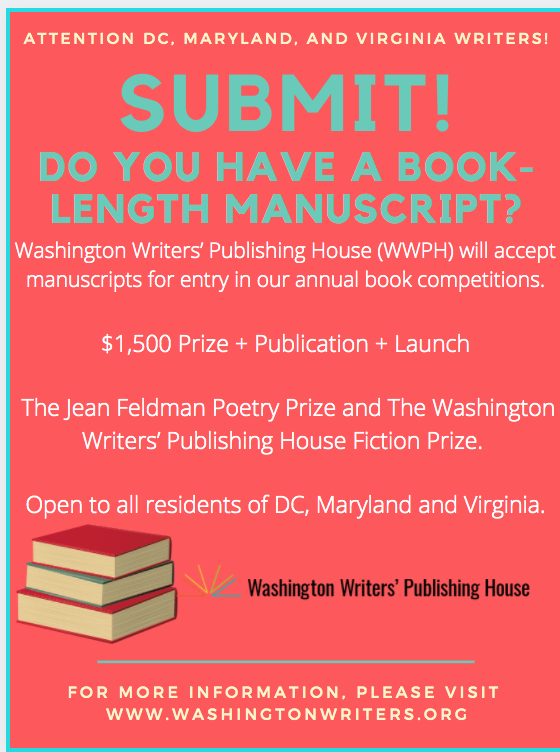 LAST CHANCE TO SUBMIT TO OUR ANNUAL POETRY & FICTION CONTESTS! Deadline is Monday, November 15.
LAST CHANCE TO SUBMIT TO OUR ANNUAL POETRY & FICTION CONTESTS! Deadline is Monday, November 15.
The Washington Writers’ Publishing House’s annual JEAN FELDMAN POETRY Prize and FICTION Award for full-length poetry and fiction manuscripts is now open through November 15th. We have expanded our geographical outreach to include any resident from the DMV. We have also increased our awards to $1,500 and will select one winner for fiction and poetry and up to three finalists in each category. Our entry fee also remains at 2020 levels: $25.00. Adam Schwartz and Steven Levya, 2020 fiction and poetry award winners, will lead the judging. Submit here.
WWPH WRITES THE HOLIDAYS CONTEST
Submit your work inspired by our prompts! One DMV poet and fiction will win $100 and publication in WWPH Writes on December 24, 2021. WWPH Writes editors, Caroline Bock and Jona Colson, will judge with Kathleen Wheaton, the president of WWPH. FREE to submit. Deadline for the contest: November 22nd.
Poetry Prompt: A Mind of Winter
As Wallace Stevens writes in “The Snowman,” “one must have a mind of winter.” What’s in your winter mind? The solstice? A holiday? Decorations? Or something more mysterious and darker. What hesitations do you have about winter? What conflicts? What desires? Let us read them and consider them for our WWPH Writes Holiday edition.
Fiction Prompt: A Gift
The O. Henry classic, “The Gift of the Magi,” is the tightly-written, unforgettable story of Della and Jim and their unexpected gifts to one another amid a very difficult year. If you haven’t read this story, it’s worth reading, especially for the dialogue and pacing. It’s here, in the public domain. Here’s our fiction prompt: Write your 2021 version of “The Gift of the Magi.” Imagine two characters grappling with gift-giving in this unprecedented year, in 2021. End with a twist worthy of O. Henry, or even more so, worthy of you! Aim for 1,000 words or less. Submit here.
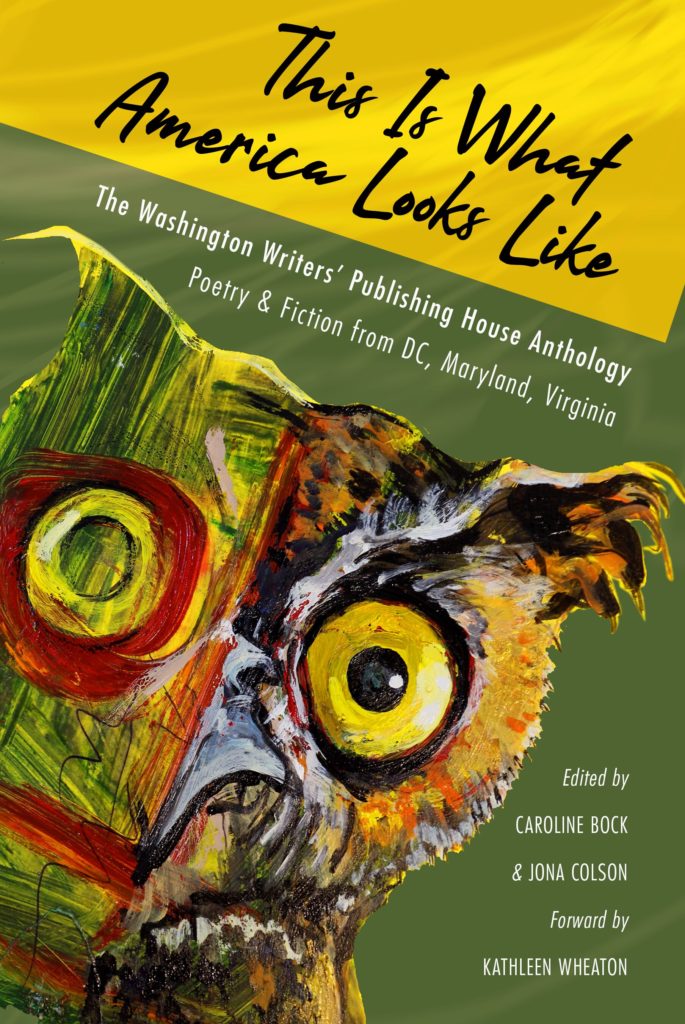
HOLIDAY BOOK SALE AT WWPH BOOKSTORE! USE THE PROMO CODE holidaywrites for 10% off all titles…only until December 6th. Order now for your books to arrive by the holidays!
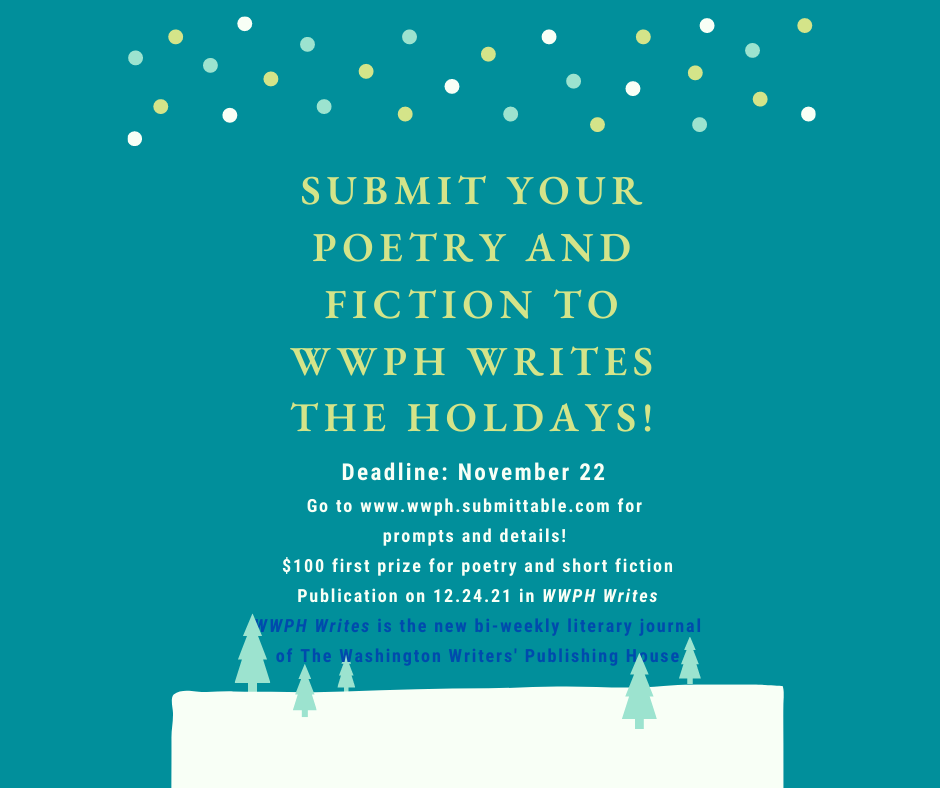
Thinking of submitting to WWPH Writes? We are looking for poetry and fiction that celebrate, unsettle, and question our lives in the DC, Maryland, and Virginia area (DMV) and in our nation. We seek work that is lyrical and dynamic, and we believe in cultivating a diverse environment of content, form, risk, and experimentation. New perspectives and voices with craft and fierceness are strongly encouraged to submit. Send us your best work–challenge us with your ideas and your writing. We look forward to reading your poems and stories! Submit here.
WWPH Writes is the bi-weekly literary journal of The Washington Writers’ Publishing House, a nonprofit, 501c3, all-volunteer, cooperative press. You can now easily donate to WWPH and help us support and celebrate DMV writers via our new donation page. Interested in a legacy? We are looking for a sponsor to ‘name’ our annual Fiction Award. Please email us at wwphpress@gmail.com, if you are interested. Most of all, thank you for reading and being part of the WWPH community!
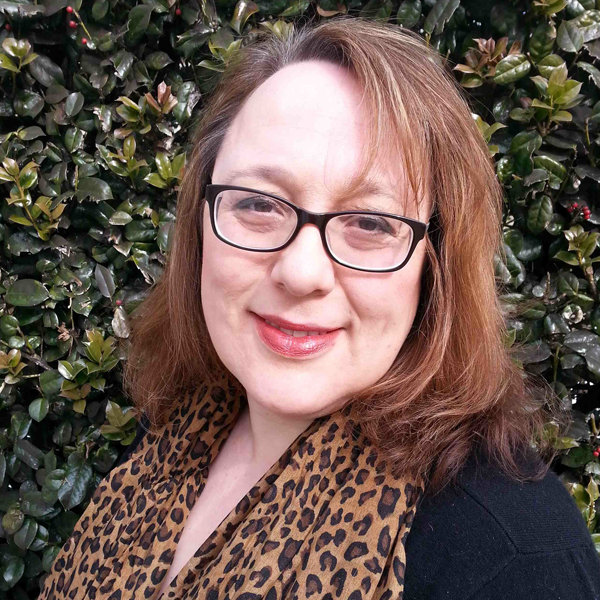
Caroline Bock
Fiction Editor, WWPH Writes
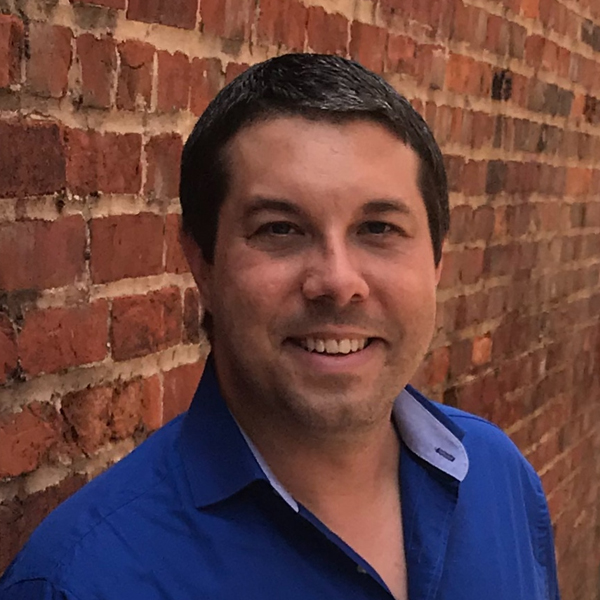
Jona Colson
Poetry Editor, WWPH Writes

